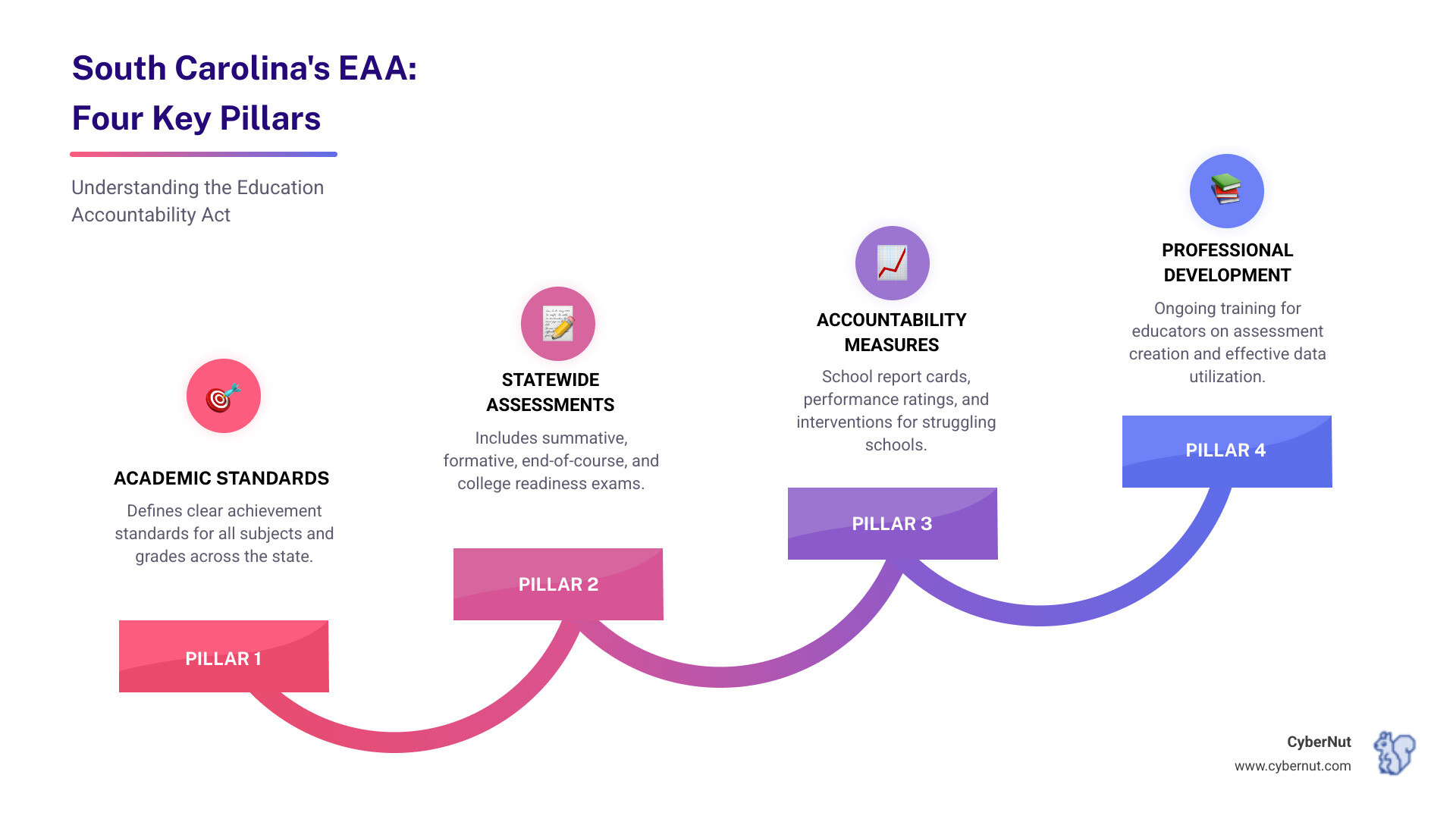
Oliver Page
Case study
November 11, 2025

All About EAA Data Requirements for South Carolina School Districts centers on a critical shift in educational accountability. Starting in the 2025-2026 school year, every district must collect, manage, and report formative assessment data for students in kindergarten through eighth grade. This new mandate, part of South Carolina's Education Accountability Act (EAA), requires districts to use state-approved, nationally normed assessments in English/language arts and mathematics three times per year (fall, winter, and spring). All data must be submitted to the South Carolina Department of Education (SCDE), or districts face a 10% reduction in State Aid to Classroom funding until they comply. The SCDE will then compile this information into an annual report for the General Assembly.
For IT directors managing these data requirements, the challenge extends beyond technical infrastructure. You're responsible for ensuring the secure collection, storage, and transmission of sensitive student information—including performance metrics, demographic details, and personally identifiable information (PII)—while meeting tight deadlines. This is precisely the data cybercriminals target.
The EAA data requirements are more than a compliance checkbox; they are part of a comprehensive system to improve student learning, measure performance against state standards, and satisfy federal reporting requirements under the Every Student Succeeds Act (ESSA). However, with increased data collection comes increased risk.

Learn more about All About EAA Data Requirements for South Carolina School Districts:

Passed in 1998, South Carolina's Education Accountability Act (EAA) created a system to ensure every student receives a quality education. The EAA's mission is to promote student learning, measure performance against state standards, and identify where students, schools, or districts need extra help. It works in tandem with federal laws like the Every Student Succeeds Act (ESSA), which requires statewide assessment programs and detailed reporting.
For districts navigating All About EAA Data Requirements for South Carolina School Districts, understanding this foundation is key. The data you collect and protect fuels educational improvement statewide. With that responsibility comes the need to guard sensitive information against cyber threats. Our Cybersecurity Insights for South Carolina School Districts can help you understand the security landscape, while the South Carolina Department of Education provides official guidance.
Making the EAA work requires a team effort with specific roles:
The EAA's goal is a performance-based accountability system that improves education and prepares students for the future, as outlined in the Profile of the South Carolina Graduate. Two key tools help achieve this:
As districts work to meet these goals, they handle vast amounts of sensitive student data. The cybersecurity challenges are real and growing, making it essential for administrators to understand both the accountability system and the security measures needed to protect it.

Understanding South Carolina's statewide assessment program is essential for grasping All About EAA Data Requirements for South Carolina School Districts. The system includes summative assessments (end-of-year), formative assessments (ongoing feedback), end-of-course tests, and college readiness exams. Together, they create a complete picture of student progress, with support for all students through approaches like Personalized Learning and Special Education Services.
Summative assessments measure mastery of South Carolina's academic standards at the end of the school year.
In high school, the End-of-Course Examination Program (EOCEP) focuses on "gateway courses" critical for college and career success. Crucially, EOCEP scores count for 20 percent of a student's final grade in these courses, directly impacting their GPA and progression. Beyond grades, these exams encourage instruction aligned with academic standards, promote student achievement, and measure program effectiveness. Local school boards may also allow individuals who previously failed exit exams to petition for a diploma, with resources like Duplicate High School Diploma available for assistance.
To prepare students for life after high school, the EAA ensures all eleventh and twelfth graders are offered assessments like the PSAT, ACT, and SAT. The preparation starts earlier, as tenth graders take diagnostic tests like the pre-ACT or Aspire to get an early look at college readiness. Recognizing that there are multiple pathways to success, career readiness assessments like WorkKeys measure foundational skills needed for the workplace. For students and adults on vocational paths, Adult Education provides additional resources.

South Carolina is shifting its focus to include formative assessments—tools that give teachers real-time insights into student progress. This shift, central to All About EAA Data Requirements for South Carolina School Districts, recognizes that timely diagnostic information is crucial for improving instruction. When teachers can see where students are struggling while there's still time to help, they can adjust their teaching and provide targeted support.
With more data collection comes more responsibility. The formative assessment data you gather is a prime target for cybercriminals, making a strong Data Security and Privacy Plan essential. Staying current with federal laws like FERPA: The Federal Student Privacy Law That Still Matters in 2025 is also non-negotiable.
Beginning with the 2025-2026 school year, the State Board of Education will create a statewide adoption list of no more than five nationally normed formative assessments. Every K-8 student will be assessed in English/language arts and mathematics using these tools, which must meet professional measurement standards. Assessments will be administered three times annually (fall, winter, and spring) to track student growth and identify needs early. The SCDE will reevaluate the adoption list every four years to maintain quality.
You can find the current approved assessments on the Adoption List of State-Approved "Formative" (Interim) Assessments.
Districts are now legally required to provide all formative assessment data and scores by grade level and school to the department from the prior school year. The consequences for non-compliance are serious: any school district failing to provide this data will have ten percent of their State Aid to Classroom funding withheld until the data is provided. The SCDE compiles this information and submits a comprehensive report to the General Assembly by June 1 annually.
For IT directors, this means building robust and secure data management systems. When incidents occur, knowing how to respond is critical. Our SC Schools Data Breach Notification Guide provides practical guidance. To assess your current risk, consider a complimentary Phishing Audit.
South Carolina uses rigorous criteria to ensure all approved assessments are objective, reliable, and valid. First, all test items must align with the South Carolina College- and Career-Ready Standards, a fact verified by alignment studies. The selection also involves a two-stage evaluation: first, measurement experts review publishers' research for technical quality, validity, and reliability. Second, specialists conduct an alignment study to ensure test items truly measure state standards. This meticulous process, detailed in the 2024 South Carolina Code of Laws Title 59 - Education Chapter 18, ensures that decisions are based on high-quality data.
The collection of EAA data culminates in an accountability system designed to drive continuous improvement. It's about translating data into actionable strategies that benefit students. For school leaders, this means using data effectively while also safeguarding it. Our guide on K-12 Cybersecurity: Protecting Schools from Evolving Threats emphasizes this dual responsibility.
Each September, the SCDE publishes annual school and district report cards, providing a transparent look into educational quality for parents and the public. These reports cover academic achievement, student growth, graduation rates, college and career readiness, and school climate. A key feature is the disaggregation of data by student subgroups (race, socioeconomic status, etc.), which helps identify achievement gaps and target support. The EAA mandates that these report cards be furnished to parents and the public by September first annually, ensuring all stakeholders have clear information to discuss school improvement.
For technical guidance, districts can use the 2024 Report Card Simulator Video Walk-Through. The State and Local Educational Agency (LEA) Report Card Checklist outlines federal requirements.
South Carolina's accountability system balances recognition with intervention. The Palmetto Gold and Silver Awards Program recognizes schools for high academic achievement and for closing achievement gaps. Consistent high performance can earn these schools greater autonomy and flexibility from certain regulations.
Conversely, schools identified as "underperforming" or "chronically underperforming" receive targeted support and must develop comprehensive, community-involved turnaround plans. A chronically underperforming school is one with an "unsatisfactory" rating for three consecutive years. In the most severe cases, the State Superintendent of Education may seek a "state-of-education emergency declaration," which can lead to the state assuming management of the school or district.
The integrity of All About EAA Data Requirements for South Carolina School Districts depends on protecting the data that underpins this system. Training programs like Cybersecurity Training Empowering K-12 Staff Against Cyber Threats are essential for all staff involved in these accountability processes.
Navigating All About EAA Data Requirements for South Carolina School Districts can be complex. Here are answers to some common questions from IT directors and administrators.
If a district fails to provide the required formative assessment data to the SCDE, ten percent of its State Aid to Classroom funding will be withheld until the data is submitted. This is a direct financial penalty, underscoring the critical importance of having robust processes for data collection and submission to ensure compliance and protect school funding.
Section 59-18-310 has been amended over time to align with federal laws like ESSA and to improve the state's accountability system. The most significant recent amendment mandates the use of state-approved, nationally normed formative assessments for K-8 students starting in the 2025-2026 school year, reflecting a greater focus on in-year diagnostic data.
In compliance with the Individuals with Disabilities Education Act (IDEA), students with disabilities fully participate in the assessment program. Their Individualized Education Program (IEP) teams determine if they take general assessments (like SC READY) with accommodations or if the South Carolina Alternate Assessment (SC-Alt) is more appropriate for those with the most significant cognitive disabilities. This ensures all students are assessed fairly. For more resources, districts can consult the Special Education Services office.
Navigating All About EAA Data Requirements for South Carolina School Districts is a significant responsibility, requiring a deep understanding of educational policy and technology. These requirements represent a commitment to using data to guide instruction, support students, and ensure they are prepared for college and careers. The new K-8 formative assessment mandates, starting in the 2025-2026 school year, mark a shift toward more timely, diagnostic data that empowers teachers to make real-time adjustments.
However, with increased data collection comes increased risk. The sensitive student information you're gathering is a prime target for cybercriminals. As South Carolina schools steer these complex data requirements, ensuring the security of sensitive student information is paramount. Protecting this data from cyber threats is as crucial as collecting it.
The good news? Building a strong defense doesn't have to be complicated. CyberNut provides specialized cybersecurity training designed specifically for K-12 schools, with a focus on phishing. Our automated, gamified micro-trainings are custom-built for educational institutions, creating an engaging, low-touch way to turn every staff member into a vigilant defender of student data. We understand the unique challenges schools face and have built our approach to make cybersecurity resilience accessible and effective. Learn more about our Phishing Awareness Training Program.
Want to understand where your district stands right now? Consider getting a complimentary Phishing Audit. It's a straightforward way to identify your current vulnerabilities and start building the cybersecurity resilience your district needs. Because when it comes to protecting our students and their futures, data security isn't optional—it's essential.

Oliver Page

Some more Insigths


Back